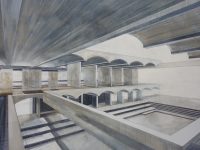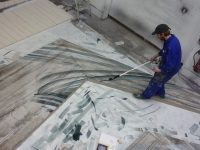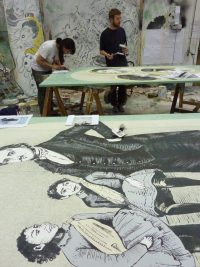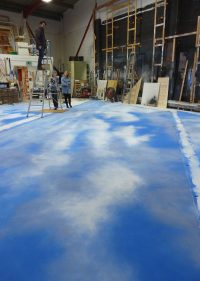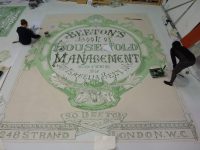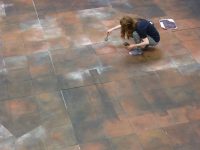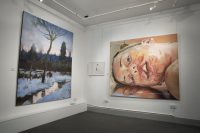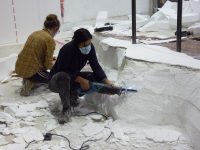Search the website

-
Award
MA Scenic Art
-
UCAS Code
BOV8
-
Duration
One year (full-time)
Course Overview
ⓘ The MA in Scenic Art has been suspended for the 2021−22 academic year due to staff changes. It is not currently possible to apply for this course. Please check back in the spring for updates regarding 2022 entry. If you require further information, please contact us.
Our Scenic Art MA is taught by highly experienced industry professionals and offers an intensive, vocational training in scenic art. BOVTS enjoys strong links to the theatre and entertainment industries and we are proud of our exceptional employment record.
The course is open to a maximum of four students who wish to develop their careers as scenic artists.
Graduates will be equipped with the necessary specialist skills required to work in the following industries; Theatre, Opera and Ballet, Film, Television and Animation.
The Course runs over three intensive terms during which time students gain skills and experience in scenic art techniques and their application. During the course students will acquire a thorough understanding of industry practice and standards.
Teaching is led by the school’s Head of Scenic Art in collaboration with visiting industry professionals.
 Copy of Jenny Saville's 'Reflect' in progress.
Copy of Jenny Saville's 'Reflect' in progress.
Operating from our Scenery Workshops in Bristol and as part of a mid-scale theatre production company.
Students will work with professional designers as well as student designers. There will be opportunities to attend design and production meetings to gain an understanding of the roles and demands across all theatre production departments.
Students also receive master-classes in a range of skills and techniques which currently include: perspective, marbling, scenically painting an Old Master, wood-graining and polystyrene carving.
Ongoing project work is also an important part of the professional development of the scenic art students and students graduate with a strong portfolio of their work while at BOVTS.
Prior to graduation students complete work placements at some of the most respected scenic art workshops in the UK.
Upon graduation students showcase their work in a public exhibition and are interviewed by some of the UK’s leading industry practitioners.
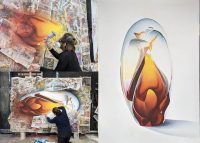
Recent Graduate Theatre Employment Includes:
The Royal Opera House, The Royal Shakespeare Company, Cardiff Theatrical Services, The Royal National Theatre, Northern Ballet, TR2 Plymouth, Richard Nutbourne – Cool Flight Ltd, Rocket Scenery, Glyndebourne Opera Festival, Bristol Old Vic Theatre, Bay Productions, TV adaptation of Romeo and Juliet for the National Theatre, Upstart Crow for the West End
‘Foot Asylum’ -Commercial.
Image: Scenic copy of Jenny Saville’s ‘Reflect’ by Scenic Art student Emma Inge.
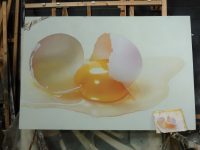
Recent Graduate Film & TV Work Includes:
The Nevers, Extinction, War of The Worlds 2, The Last Bus, Dungeons and Dragons, The Irregulars, A School for Good and Evil, Embankment, The Great, Good with Wood, Silent Witness, Spanish Princess, Doctor Who, Becoming Elizabeth, Crackerjack, Amelia Gething Complex, Shaun the Sheep: Farmageddon, Robin Robin, James Ray, Ackley Bridge, Gentleman Jack
Image: Spray project by Scenic Art student Radhika Parekh.
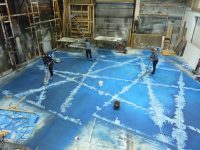
Work Placements
Prior to graduation students complete work placements at some of the most respected scenic art workshops in the UK.
Upon graduation students showcase their work in a public exhibition and are interviewed by some of the UK’s leading industry practitioners.
BOVTS values its strong links to the theatre and entertainment industries and we are proud of our exceptional employment record.
ⓘ The MA in Scenic Art has been suspended for the 2021−22 academic year. The information shown below is subject to change for future years.
-
Locations
Operating on three specialist teaching sites (Downside Road, Christchurch Studios and Sheene Road all located in Bristol) and performing in the major producing theatre venues in Bristol: Bristol Old Vic, Circomedia, Tobacco Factory, Wardrobe Theatre and Redgrave Theatre.
-
Awarding body
University of the West of England (UWE Bristol)
Recent changes in the higher education landscape have fundamentally altered the dynamics between the Conservatoire for Dance and Drama (CDD) and its six Member Schools. Having reflected carefully on the implications of these changes and the opportunities that they present for the member schools, it has become clear to all that it is most desirable for the schools to pursue independent pathways. The CDD and its Member Schools are now working closely with each other and the Office for Students (OfS) to set each on its own path and to perform an orderly wind-down of the CDD no later than July 2023, with BOVTS preparing to leave CDD on 31 July 2022.
BOVTS has confirmed that the University of the West of England (UWE Bristol), who currently validate BOVTS degree courses independently of CDD is BOVTS’ preferred partner when it leaves CDD. It is therefore anticipated that all students who commence training in 2021 will receive their degree from UWE Bristol. When details of the refreshed partnership are confirmed, all applicants will be informed by email. Where this results in a change to terms and conditions for current students, the changes will be clearly set out and a full consultation process will be undertaken. Where this results in a change to terms and conditions for applicants who have accepted an offer, the changes will be clearly set out, the cancellation of the contract period will be reopened and candidates will have the option to change their mind about their offer acceptance without penalty.
-
Entry requirements
Applicants would normally be expected to have an honours degree in a related subject area such as Fine Art, Illustration, Painting and Drawing, Sculpture, Graphics, Film, TV, Animation or Theatre. However applicants with extensive relevant professional experience will also be considered.
Interviews will be taken in a two-stage approach; a first meeting on-line with the Course Leader and submission of a portfolio, and the second in person interview and tour of the facilities at Sheene Road, Bristol (subject to change).
There are no interview fees.
In a portfolio we are primarily looking for a high standard of drawing skills and personal paintings in any medium and to any scale. We would also be interested in any professional work that you have been part of, including process images if available, and other related work such as sculpting, printmaking etc.
If English is not your first language, you will need to demonstrate English language proficiency through a relevant qualification, such as the International English Language Testing System (IELTS), which can also be used to satisfy UK Visas and Immigration (UKVI) requirements. For MA Scenic Art, an overall score of 7.0 is normally required, with a minimum of 7.0 in each component of reading, writing, listening and speaking.
-
Course Outline
The majority of the teaching and learning will be centred on the Theatre School’s main house shows. A great deal of time is spent learning and exploring the many specialist techniques required before applying these to the scenery. Students will have the opportunity to see their work in public venues around the city.
Emulating the professional world, students will be required to work long hours to meet the deadlines of putting a show on stage and work closely with designers and other production departments, learning collaborative, problem solving and creative interpretation skills.
Tutors work alongside students, teaching and guiding as the shows progress. Students will mainly be working in a team with others on the course and will work individually in the masterclasses and or other project work, such as spraying, throughout the year.
Alongside the shows there will normally be masterclasses, taught by industry specialists in Woodgraining and Marbling, Perspective, scenically painting an Old Master, and a Polystyrene carving workshop.
Term 1
- The first three weeks will be dedicated to practical classes and seminars in the role of the scenic artist, the production process, terminology, health and safety, surfaces, preparation and priming, paints and textures, brushes, tools and materials.
- Basic colour theory, mixing and matching colour, scaling up, drawing devices, basic carpentry.
- One or two of the Theatre School productions will be painted in the following six weeks. Learning and applying the techniques for the first shows and will be done working in groups of peers under the supervision of the Head of Scenic Art and following the defined guidelines of the professional designers.
- Students will learn about paint calls which will be required on both shows as part of the production process.
- The final two weeks will be dedicated to a masterclass in reproducing a scenic copy of an old master, using advanced specialist techniques.
- A great emphasis is placed on portfolios and students will be photographing and recording their work throughout the year.
- Students keep an annotated diary of each of the masterclasses and shows that they have worked on throughout this term.
Term 2
- Students normally will paint two of the School’s main house shows.
- Under the guidance and support of the tutors, students have the opportunity to supervise or deputise on the Schools public productions. They will learn how to work collaboratively with the student designers, produce samples for the designer’s approval, work as part of the production team and attend production meetings and paint calls, quantify and order materials and paints.
- Masterclasses will normally be held in Wood-graining and Marbling and a workshop for one week in 3D Polystyrene carving.
Term 3
- Under the guidance and support of the tutors, students will have the opportunity to reverse roles as either supervisor or deputy Scenic Artist on the School’s two graduate productions.
- Throughout this term we will be preparing for the exhibition including portfolios and business cards.
- There will normally be an exhibition of their work with the Costume and Design students at one of the city’s leading art gallery’s where industry interviews will be arranged.
- A masterclass in Perspective will normally be held at the end of term
Visits to some of the UK’s leading theatre workshops will normally be arranged, usually throughout the first two terms
-
Module Map
This module map provides a list of the modules that make up your course. Each module is worth a specified number of credits: All modules are compulsory, enabling you to cover key subject knowledge while developing your own interests.
-
- Year 1
- Module number: UAMN8Y-45-M Module name: Scenic Painting Theory and Techniques (45 Credits)
- Module number:UAMN93-45-M Module name: Applied Scenic Art (45 Credits)
- Module number:UAMN94-45-M Module name: Scenic Art Department Management (45 Credits)
- Module number:UAMN95-45-M Module name: Industry Engagement/Exhibition (45 Credits)
- Each module 45 credits at level M.
- Total 180 credits.
Interim Award for 90 credits: PG Cert.
- Each module takes between 7 and 11 weeks each to complete.
Award: MA Scenic Art
-
-
Teaching and Learning
The programme is practical and career focused. It is integrated with the school’s other programmes during productions, as well as within the professional environment, as some performances take place in local professional theatres.
The programme features a high level of one-to one teaching by industry professionals and work is realised for industry standard performances.
The learning is immersive and singular in its focus on high level specialist professional employability as a main learning outcome.
There is a maximum of four students accepted to this course.
Students are taught / supervised by teaching staff for at least 35 hours per week across the 38 weeks of the programme.
Students will normally be in class Monday – Friday between 8.30 am and 5.30 pm although during production periods, there will also be evening and weekend work.
Usual class size is 4. When working on productions, Scenic Art students will work with other groups of students from across the school.
Average independent study time is 60 hours per term.
Placement learning:
Students will normally have the opportunity to complete a placement within a professional theatre of specialist scenic workshop. The placement is arranged by negotiation between the student, the course tutors and the placement organisation with due regard to the student’s profile, and other course commitments.
Monitoring of the placement is undertaken by School staff. The placement organisation will provide a mentor for the student who will also act as a contact for the School. Where possible both student and placement organisation will provide a report of the student’s performance whilst on placement.
Placements can be anywhere in the UK and previous placements have been offered at the Royal Opera House, the National Theatre, the Royal Shakespeare Company and Aardman Animations. Accommodation and travel expenses incurred whilst on compulsory placement will be reimbursed by the School.
ⓘ Due to the ongoing impacts of the Covid-19 pandemic, BOVTS cannot guarantee the length of external work placements. However, in the 2020-21 academic year, work placements were typically two weeks in length.
-
Academic and Student Support
As part of the Conservatoire for Dance and Drama (CDD), the School is committed to selecting, training and supporting students, regardless of ethnicity, gender, disability, age, sexual orientation or religion.
Applicants to CDD schools are chosen solely on the basis of their talent and potential to develop the skills required for their chosen profession. The School does, however, judge applicants on their suitability for a course and their potential to successfully complete the training, as the work is rigorous and requires high levels of energy and commitment.
Student Support on the programmes at the School covers a variety of areas such as support for disabled students, academic support, student finance and health and welfare.
Julia Heeley, Student Support Manager, is able to answer queries about support available for disabled applicants/students. Her email address is [email protected] and she can also be reached by telephone on 0117 980 9247.
Our Academic and Student Support services team provides help in the following areas:
Support for students with disabilities including specific learning difficulties
In our admissions process, we are committed to supporting students with disabilities.
Disabled students are encouraged to disclose their support requirements so that we can endeavour to meet them during the audition process and subsequent training.
The School welcomes all students regardless of disability. It is our aim to provide appropriate support so that all students are able to achieve their full potential.
Students with a disability will be provided with advice and support from the Student Support Manager. If you have a disability or specific learning difficulty we recommend you contact her either prior to starting your course or during your first few weeks at the School to discuss any support requirements you may have.
This may include support resulting from disabilities such as sensory impairment, learning difficulties such as dyslexia or dyspraxia or mental health difficulties.
We recognise that everyone is an individual and we will work with students to identify potential barriers to training and do what we can to remove those barriers. We will also make any necessary reasonable adjustments, to ensure that disabled students can train at the School.
Quickscan screening
At the School we put a great deal of emphasis on supporting students during their time with us.
We are aware that nationally there is a very high proportion of students with Specific Learning Difficulties (SpLDs) e.g. dyslexia or dyspraxia, in institutions which specialise in art, design or the performing arts.
During your first week, the School encourages all students to take a short questionnaire known as QuickScan which has proved to be a useful piece of screening software for students and staff across the CDD Schools. It takes the form of an on-line, easy to navigate, questionnaire which will help to identify your learning style and specific areas of learning strengths and weaknesses. It is used in conjunction with other indicators, including student disclosure (as part of the interview and registration process), tutor feedback on practical and written work, and students expressing their concerns and any support requirements which may become apparent during their studies.
Disabled Student Allowance (DSA)
UK students with disabilities (including Specific Learning Difficulties and long-term Mental Health conditions) can apply for the Disabled Students Allowance (DSA).
DSA usually provides support for students with the specialist equipment and tools necessary to support you with your studies, including software, hardware and study skills support. Unlike a student loan, DSA does not have to be repaid. However, it is rarely awarded in the form of financial support.
Applications are made through, Student Finance England (SFE), Student Finance Wales (SFW), or Student Awards Agency for Scotland (SAAS).
In order to apply for DSA, Student Finance will require evidence of any impairment or disability. This may take the form of a doctor’s or specialist’s letter or, more often, a report from an Educational Psychologist (Diagnostic Assessment Report).
If you require a Diagnostic Assessment from an Educational Psychologist, the Student Support Manager can arrange this for you and can guide you through the process.
Personal Academic Support
Various staff members at the School can help in different ways if you need academic support. If you need help with the content of classes or assessment work, you can ask the relevant head of course, tutor or your pastoral care tutor for an appointment or you can ask the Student Support Manager to arrange a tutorial with the relevant member of staff on your behalf. If you make an appointment, you can prepare for the meeting and discuss your concerns away from class. Heads of courses, modules leaders and individual tutors can all help you with understanding aspects of your training and can offer overall guidance or advice about your programme of study.
Study skills (including reading, note-taking and presentation skills)
Study skills support is usually arranged for students who have been awarded support through Disabled Student Allowance (DSA). However, the Student Support Manager will be happy to arrange one to one study skills support for you if deemed appropriate and necessary.
Mental Health And Wellbeing
Schools within the CDD recognise the challenges faced by students entering higher education and that training in a conservatoire institution can place great demands on a student both physically and emotionally. The CDD has published a leaflet aimed to help students identify signs of mental distress and where to go for support.
Counselling
The School has a student therapy and counselling service, which is organised and staffed by accredited, registered psychotherapists and counsellors and is there to help with any more deep-seated personal problems on which pastoral tutors are not qualified to advise. If students wish to have an initial assessment with a therapist or counsellor, they should contact the School’s Student Support Manager. A strict professional code of confidentiality is always maintained.
Student welfare and pastoral care
We actively encourage students to develop a pro-active and positive approach to their own ‘wellness’. We are preparing professionals to enter physically and mentally challenging professions and we work to enable students to sustain a physically and mentally healthy lifestyle.
Every student is assigned a pastoral tutor who monitors they progress throughout the year in addition to having access to the Student Support Manager. All students have tutorials with their head of course, head of year or allocated pastoral care tutor in which non-teaching issues can be discussed. A confidential tutorial can be requested of any member of the full-time teaching staff on your course.
In addition, BOVTS students have access to UWE’s Student Wellbeing Service, details of which can be found here.
UWE Wellbeing Service, 3F Reception, UWE, Frenchay Campus, Coldharbour Lane, Bristol, BS16 1QY Tel: +44 (0)117 32 86268 E-mail: [email protected]
For further information on support which the School offers, please see the Guide to Student Support.
You can also find additional information for disabled applicants and students at all Conservatoire for Dance and Drama affiliated Schools here.
-
Teaching Staff
You will be taught by an experienced teaching team whose expertise and knowledge are closely matched to the content of the modules on the course. The team includes Head of Scenic Art and visiting Scenic Art industry professionals.
You can learn more about our staff by visiting our staff profiles.
-
Assessment
Students are assessed against industry standards in Scenic Art.
Assessment is practical project based and will include detailed written feedback from teaching staff and the student’s own self-critical annotated portfolio / diary.
Students are assessed on a pass or fail basis.
Judgements about students’ performance are made against the relevant industry standards.
The UWE qualifications are awarded as non-classified/non-differentiated.
-
Fees and Funding
MA Scenic Art
Duration: 1 year (full-time)
Fees:
UK students tuition fees for the MA Scenic Art course starting in September 2022 will be £11,400 for the whole course.
International students (non UK) tuition fees for the MA Scenic Art course starting in September 2022 will be £25,500 for the whole course.
(Full-time route only, subject to further increase in subsequent years in line with Government policy)
Please note that permanent Irish residents applying for 2022 entry will be classed as ‘home’ student status as a result of the Common Travel Area agreement and are not liable for international fees.
It is not possible to confirm fees for future academic years, as these are dependent on Teaching Excellence Framework outcomes, but the maximum increase in each year will not exceed the rate of inflation, as measured by the Consumer Price Index (CPI).
The following course-related costs are included in the fees:
Course materials provided but students will have to allow funds to provide their own work clothes and contribute to some costs towards their self-promotion – estimated at £400.00.
Accommodation and living costs are not included in the fees.
Increasingly, much of the information and some of the content of the course is available via the School’s virtual learning environment and so you will benefit from having access to your own personal computer and the internet to make the most of your course. It is estimated that a suitable personal computer will cost £300.00. (Please check with the Course leader for recommended functionality.) You will need to research the most cost-effective way of accessing the internet. The School has a number of means tested scholarship funds available to assist students with purchases of computer hardware and other essential costs which would otherwise cause financial hardship.
Info and advice regarding potential accommodation and living costs can be found in the General Student Information Handbook
Industry work placement – accommodation and travel expenses will be covered.
For Overseas students only:
Student Visa if applying from outside the UK £348.00
Immigration Health Surcharge (with discount for Student Visa holders) £470.00.
Sources of financial support
If you receive funding from Student Finance you may be eligible to apply for additional benefits.
Details can be obtained from our Student Fees home page.
Bursaries, scholarships and prizes
Please see the BOVTS Fees and Financial Support page for details of Bursaries and Scholarships.
The University also provides a number of scholarships and prizes for undergraduate students, which you may be eligible to apply for. Some of these are available to students on any course (such as the Hardship Fund and bursaries offered by charitable trusts).
There is also the Queen Elizabeth Scholarships.
The Queen Elizabeth Scholarship Trust (QEST) funds the education of talented and aspiring craftspeople through traditional college courses, apprenticeships or one-on-one training with masters.
The charitable arm of the Royal Warrant Holders Association, QEST was established in 1990 to celebrate the 150th anniversary of the Association and the 90th birthday of Queen Elizabeth, The Queen Mother. Since then the Charity has awarded almost £4.3 million to over 500 craftspeople, of all ages and backgrounds, across 130 craft disciplines.
In May 2017 HRH The Prince of Wales became the charity’s Patron with Vice-Patrons The Earl of Snowdon and the Marquess of Salisbury. QEST is honoured by their support and looks forward to continuing to champion excellence in British craftsmanship.
-
Rules and Regulations
A copy of the rules and regulations governing the course is also available.
-
How to Apply
ⓘ The MA in Scenic Art has been suspended for the 2021−22 academic year due to staff changes. It is not currently possible to apply for this course. Please check back in the spring for updates regarding 2022 entry. If you require further information, please contact us.
- Policies and Procedures


